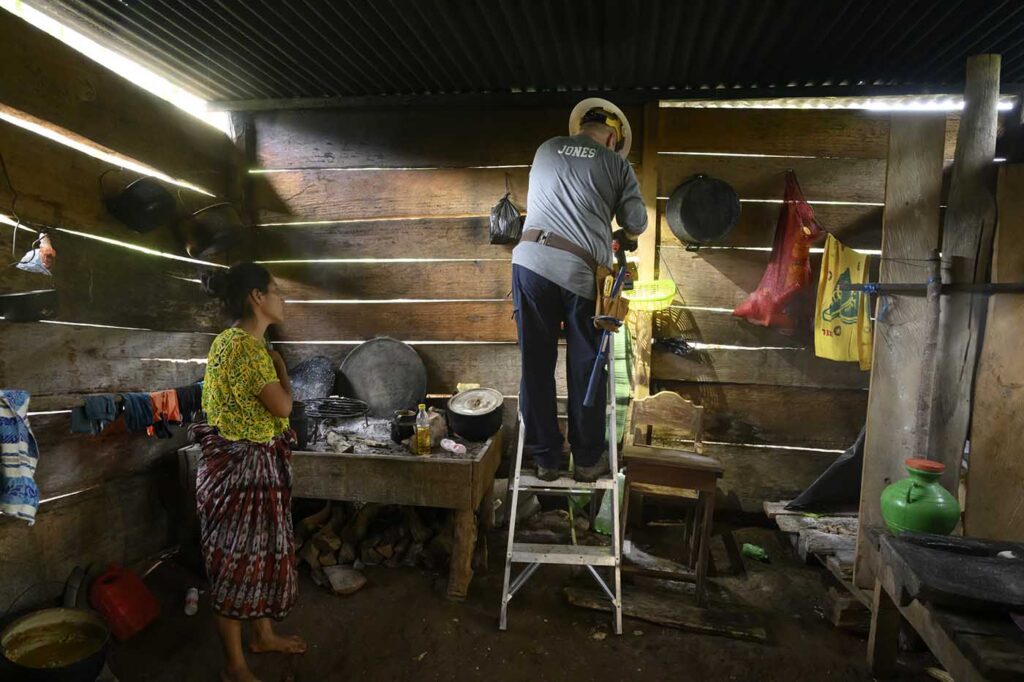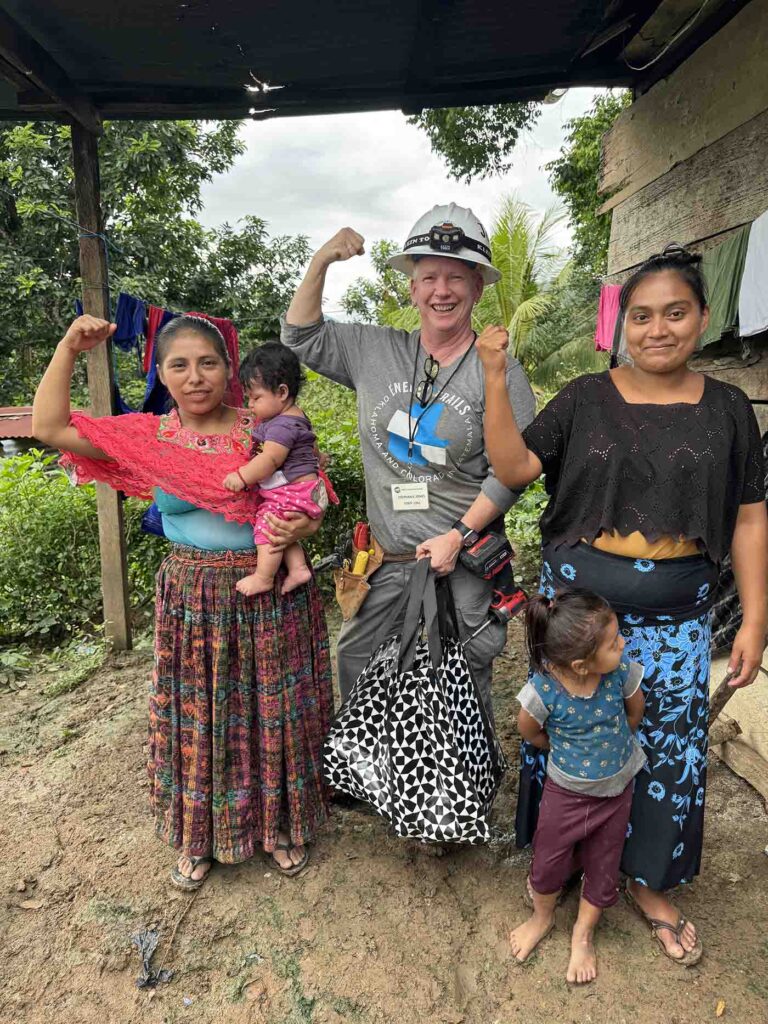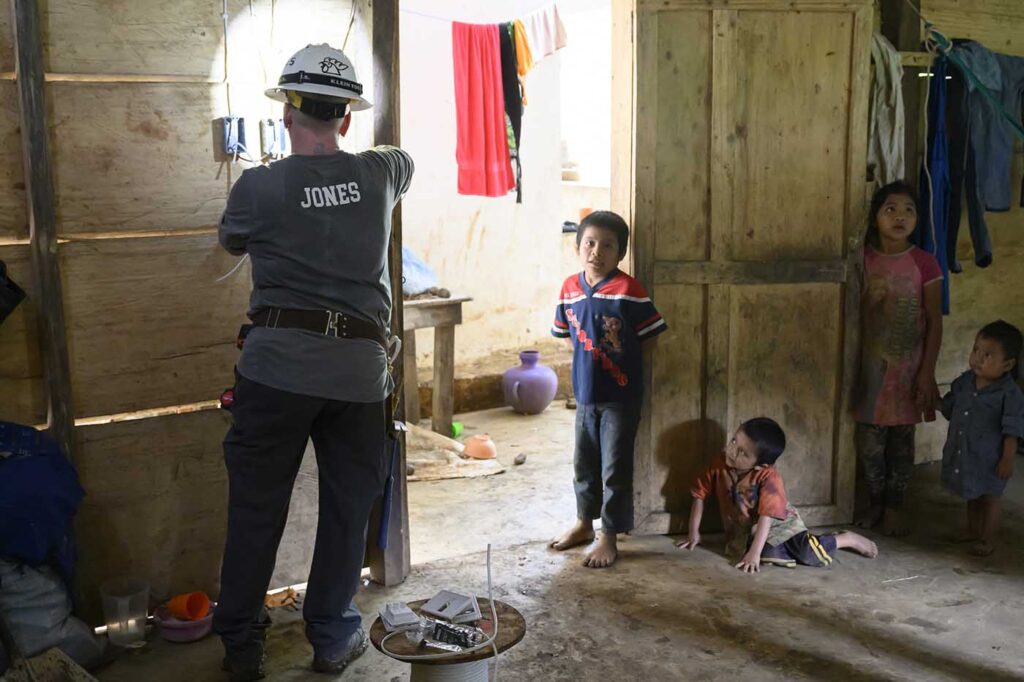
When Stephanie Jones headed to the remote mountain villages of northcentral Guatemala to help bring electricity to farmers and their families, she stood out for two reasons: she was the only woman among the 20 volunteers from electric cooperatives, and she was the only one who wasn’t a lineworker.
Jones, 53, is the chief technology officer at Cimarron Electric Cooperative in Kingfisher, Oklahoma, and runs the co-op’s IT department, where she focuses on computers and data all day.

But she is also a self-taught electrician who put her skills to work installing light sockets, switches and outlets inside about 200 small houses in 38 villages last December as part of a joint project organized by NRECA International and Heifer International.
“I grew up very poor and, if we wanted something done, we had to do it ourselves,” Jones said. “I’ve learned to be very handy at home.”
Jones tried to pass on some of those skills to at least one person in each of the Guatemalan villages in the Alta Verapaz region so that someone would know how to do simple repairs after the volunteers were gone.
“They were all very curious and interested, especially the young people between about 15 and 30,” she said. “One young man was intently watching me as I was wiring outlets and I told him, “Come on over and I’ll show you how to do this.’ I had him wire one outlet, with me watching. It was an opportunity for him to try something different.”
Unlike most NRECA International projects, the co-op volunteers did not install poles and lines. The local utilities already had lines to connect to, but the villagers couldn’t tap into that power until their homes were wired for electricity. Every house was outfitted with four lights, two outlets and two switches.
The volunteers—who came from co-ops in Oklahoma, Colorado and Arkansas—also installed meters on concrete poles outside the homes so utility companies could start providing service. They spent about two weeks wiring wooden and cinder block dwellings in the wet, humid rainforests.
“During the daytime, there were mostly just women and kids at home while the men were out on the (corn) farms or cattle ranches,” Jones said. “I wanted to make sure I placed the outlets and switches exactly where the women wanted them, so I’d ask the mom or grandmother what they’d like. There was one translator from English to Spanish and another from Spanish to Mayan. There would be four of us in this tiny little kitchen trying to communicate. But it worked.”

She said that being inside people’s homes for several hours at a time gave her more of a chance to bond with them as she talked to the women and played with the kids during brief breaks from work.
“They did take notice that I was the only woman,” said Jones, who was the first female co-op volunteer from Oklahoma to participate in an NRECA International project.
“I think they were surprised because I had a hardhat and a toolbelt and all of that, just like the guys did. I hope I might inspire some of the girls to consider doing a job like that. You never know the ripples you make.”
Jones said she knows what it’s like to feel like “the poor kid” and she’s happy that the kids in the mountain villages will no longer be so different from their classmates from town.
“You’re not the poor kids who don’t have electricity anymore,” she said. “You can flip on the light switch to read and do your math homework instead of doing it by candlelight.”
Jones’ passion and commitment for the project were evident from the start, said Anna Politano, director of public relations and communication at the Oklahoma Association of Electric Cooperatives.
“We are proud of Stephanie and the special connection she formed with local women in the villages,” she said. “The cooperative difference transcends borders. We are grateful for the selfless volunteers who made this project a success.”
Jones, who has worked at her co-op for 29 years, said she would encourage other women to volunteer.
“If you’re a woman lineworker or electrician or someone with special skills, you absolutely should apply,” she said. “It’s the experience of a lifetime. I got to meet friendly people and see beautiful places I’d never have been able to without this opportunity. And the guys I worked with were all great. I would absolutely put my name in the hat again.”
Erin Kelly is a staff writer for NRECA.